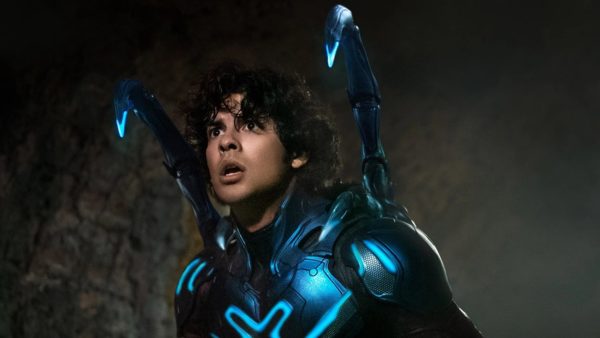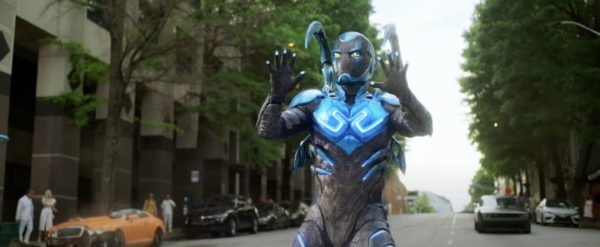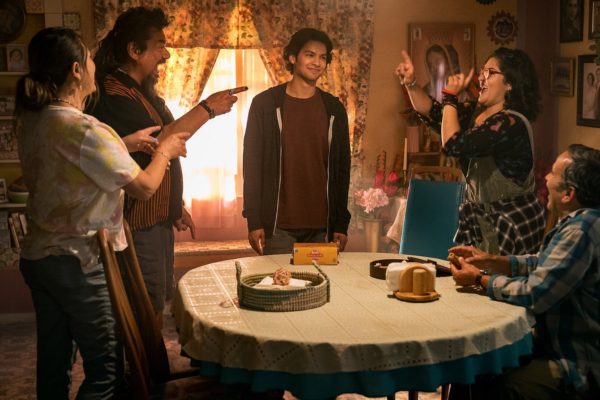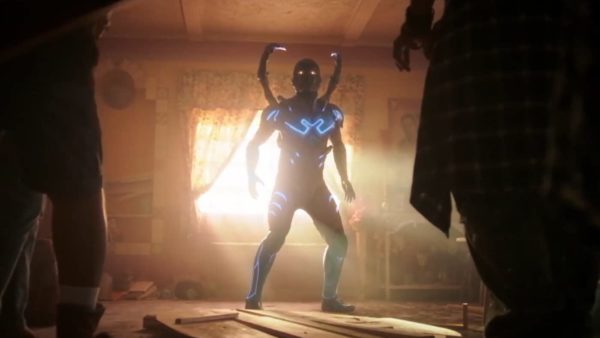
As the DCEU looks to rebuild/rebrand under the stewardship of James Gunn, the last of the pre-Gunn efforts hits screens with Angel Manuel Soto‘s Blue Beetle.
Live action superhero films are in something of a rut. This year there’s been Ant-Man and the Wasp: Quantumania (oof – I regret that semi-positive review), Guardians of the Galaxy 3, Shazam 2 and The Flash, with only the final Guardians film being both well-received and performing financially at the box office. (Clearly animated is where it’s at if Spider-Man: Across the Spider-Verse is any consideration)
Enter Blue Beetle, a Latino-led origin story set in fictional Palmera City (aka Miami) where the Reyes family is struggling with both gentrification and racism. The family has lived in the Keys for decades, but they’re threatened by the expansion of the wealthy elite (read: white). Rent has tripled, jobs are scarce, and opportunities for anyone with dark skin amounts to scraping gum from the underside of rich white women’s patio furniture.
Enter Jaime Reyes (Xolo Maridueña), a recent Gotham Law graduate returning home to find his family bankrupt and in danger of losing the house. He pledges to find a solution, promising his younger sister Milagro (Belissa Escobedo) that he’ll find a way to rescue them from poverty, but winds up working menial labour jobs to help the family.
Enter Victoria Kord (Susan Sarandon), wealthy CEO of Kord industries. She rescued the company from bankruptcy after her brother Ted decided they should stop manufacturing weapons and then disappeared. She and her niece Jenny (Bruna Marquezine) disagree about the future of the company: Victoria is putting everything into a state of the art private weapons contract with her bodyguard/enforcer Conrad Carapax (Raoul Max Trujillo), while Jenny wants to honour her father’s philanthropic bent.
Enter the Scarab, a piece of alien tech that Victoria unearths in the Arctic at the start of the film. The crux of the film’s conflict is that Victoria seeks to weaponize it to create her army, but when Jenny steals it and passes it off to Jaime, the symbiotic sentient tech bonds to the recent graduate.
The result? A new superhero is born, along with the usual detours involving forced family comedy and wacky shenanigans.

In many ways, Blue Beetle feels like a throwback. It’s a film that prioritizes “small” themes like the importance of family, empowering the little guy, and leading with humanity. Sure, Victoria is basically a warlord/tyrant, but she’s also barely threatening as a villain and she’s nearly absent throughout large portions of the film. Instead Blue Beetle tends to focus on how the Reyes’ comes together under duress.
This results in slightly lowered stakes and far more time spent on characterization. In fact, there’s barely any action in the first thirty minutes because screenwriter Gareth Dunnet-Alcocer is too focused on introducing the Reyes family and their dynamic.
This is all very welcome, particularly the extra time spent with Maridueña, who brings wide-eyed wonder and exuberance to a role that could have easily been familiar, bland and uninteresting. His chemistry with Marquezine is solid, despite the film swinging between chastity (there is a single kiss at film’s end) and horny (there are several erection jokes).

What’s unusual about Blue Beetle is how enjoyable it is, despite feeling incredibly safe and predictable. There are *no* surprises in this narrative (everything is either telegraphed or incredibly familiar), but the performances are so winsome that it hardly matters. What could be grating – from a grandmother (Adriana Barraza) who is secretly a badass to a bratty sister (Belissa Escobedo) who’s actually vulnerable to a loud-mouthed uncle (George Lopez) who is also a solid inventor – winds up working in the film’s favour.
While the idea that family is fundamental is hardly a new narrative (it’s not even particularly fresh for a Latino-centered plot), it works here because the film dedicates so much time and energy to fleshing out its family dynamic.
This is proof that Blue Beetle understands exactly what it is; the film isn’t interested in pushing the envelope or reinventing the genre. It’s not trying to be the best superhero film of all time; it’s simply trying to be an entertaining one.
And in that capacity, it succeeds admirably. Maridueña is a star, the film’s not-so-subtle (and – sadly – timely) racial critique is welcome, and there’s plenty of sequel potential. Whether that happens will depend entirely on box office: with $120M at stake and James Gunn and co. plotting new trajectories for the whole universe, Blue Beetle will likely live and die on word of mouth.
So, if you liked the OG Ant-Man or Tom Holland’s Spider-Man movies, then Blue Beetle is for you. This is a crowd-pleaser: entertaining, with a healthy dose of comedy, reasonably solid action set-pieces, and, most significantly, heartfelt performances. It’s just a genuinely good time at the movies. 4/5

Other Observations:
- Lopez’s Uncle Rudy starts off far too big and broad. The character – with his mullet, his big personality, and his affinity for large sports vehicles – pulls focus in a distracting way. As the film progresses, however, Soto finds a way to regulate the performance to the point that Lopez nearly becomes the film’s MVP. It’s a surprising feat.
- Harvey Guillén plays Victoria’s lab assistant, but he’s basically there to confirm her racism and make a heroic gesture. It’s a role unbecoming of his star stature and it made me sad that he wasn’t used more.
- The climax (naturally) takes place 1) at night 2) in the black/gray sky 3) with plenty of smoke and debris in the mix. I get that FX is complicated and expensive, but superhero films really need to find another way to stage a finale.
- As someone unaware of the comics, I’m unsure how faithful an adaptation this is. With that said, the Ted Kord stuff is heavy-handed and obviously designed to set up a potential sequel. One of the best parts of the film is how light on lore it is and if there is a Blue Beetle 2, I hope the new film takes away the right lesson: prioritize the fun and the story rather than cram in a million cameos and Easter Eggs that connect to the larger DCEU.
- Finally, language is used in a really deliberate way that is worthy of recognition. There are plenty of moments, particularly within the Reyes family, when Spanish is spoken without subtitles. And it works. The translation isn’t necessary because the film does an expert job of conveying the emotion; it’s not off-putting to non-Latina audiences, though I’m sure it was resonate even more strongly with its target audience. And that’s great!
Blue Beetle is now in theaters